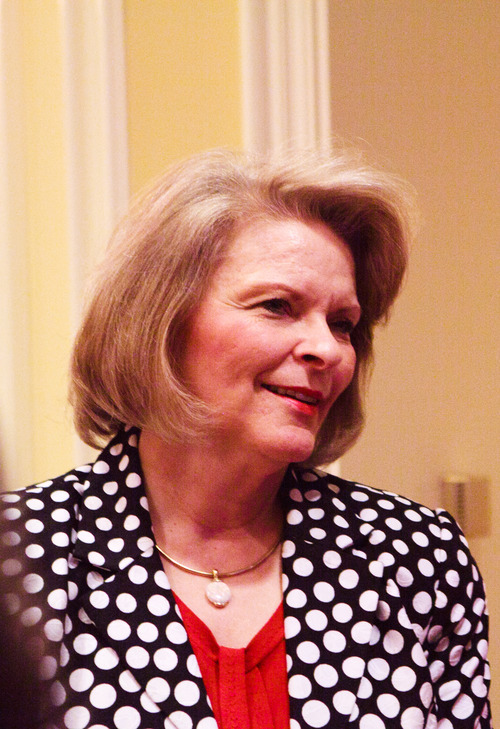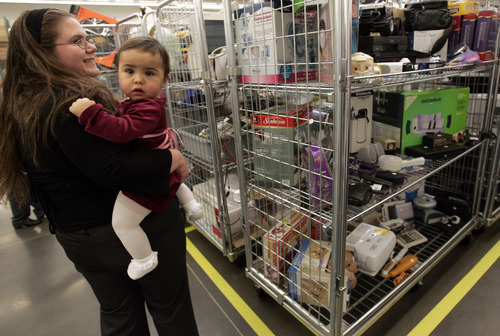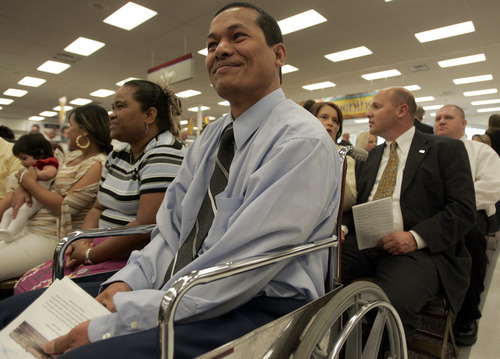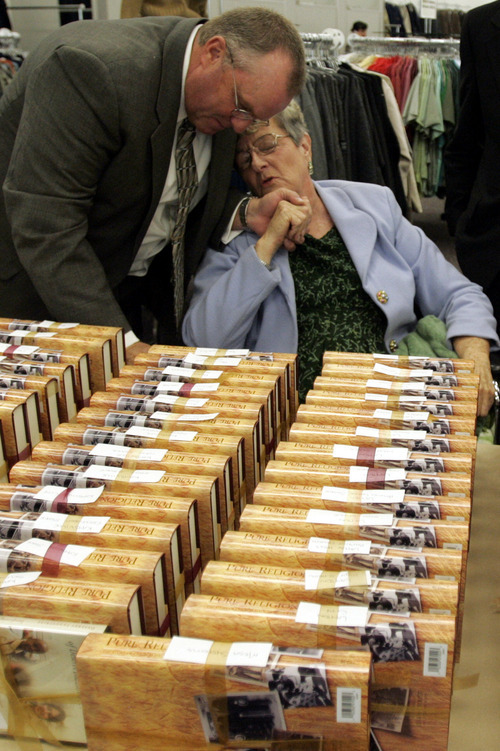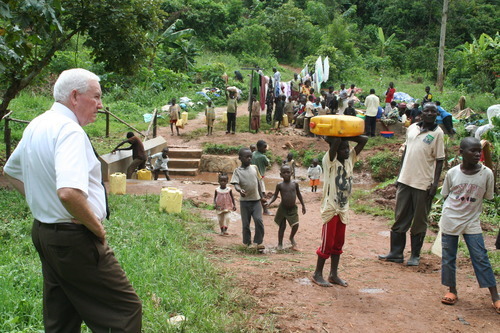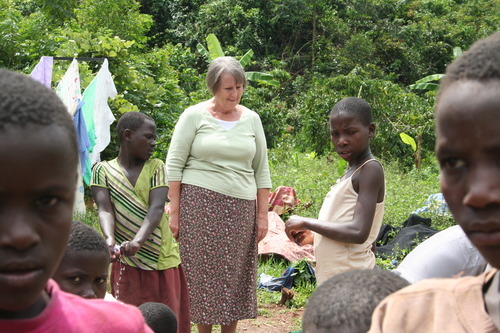This is an archived article that was published on sltrib.com in 2012, and information in the article may be outdated. It is provided only for personal research purposes and may not be reprinted.
David Neeleman launched JetBlue in February 1999 with his Mormon missionary experience in Brazil still vivid in his mind.
Having seen the extreme poverty and rigid class distinctions in that country, Neeleman built his business model instead on what he viewed as Mormon egalitarianism. No executive parking places or dining rooms. No first-class section on his planes. A strong ethos of managers and employees working side by side.
"I abhor people who think they're better because they have more money," he says in a phone interview from his home in Connecticut. "That's despicable."
Neeleman, who now runs a Brazilian airline, Azul, won a lot of public attention for his approach. Now with Republican presidential candidate Mitt Romney's pitch as the go-to guy to fix the U.S. economy, Mormon views of wealth are once again in the spotlight.
One thing is clear: Many Mormon businessmen and women end up like Romney, at the top of the corporate ladder, obviously able to compete in a free-market economy. Observers point to the Mormon upbringing of these industry titans as contributing to their achievements, citing early LDS training in public speaking, international mission experiences, knowledge of a second language and ability to work well within a strict system. Plus, faithful Mormons have a Boy Scout-like reputation for honesty and clean living — no smoking, drinking or carousing.
But outside the faith, few recognize Neeleman's second strand of Mormon economic thinking, including notions of stewardship, sharing and cooperation.
You can't read the Book of Mormon, the Utah-based church's signature scripture, says Kim Smith, who spent his career at Goldman Sachs in New York and now teaches at Brigham Young University, "without getting pounded about the equality of everything."
The book is, he says, "unambiguous about our responsibility to the poor."
—
The grand experiment • From the beginning, Mormon founder Joseph Smith felt a strong responsibility to care for his burgeoning flock of mostly poor farmers and religious seekers. Waves of immigrant converts came from parts of the East Coast and Europe to form what they hoped would be a new Zion society.
More than a quarter of what Smith said were divine revelations contained in the faith's Doctrine and Covenants relate to economics, says Warner Woodworth, BYU professor of organizational behavior.
Smith envisioned a plan known as the United Order in which individual Mormons would give all their possessions to the church, then be deeded portions "according to his family, according to his circumstances and his wants and needs."
The United Order, late LDS apostle Marion G. Romney taught, is the Lord's program for "eliminating the inequalities among men." In short, some receive more than they give, some less. This system "exalts the poor and humbles the rich."
That's not exactly a page from the Republican Party platform, nor the Democratic one, for that matter.
Some say that smacks of socialism. Not so, according to church leaders, because, among other reasons, the United Order is voluntary and nonpolitical, and participants own property.
Though the United Order and cooperative enterprises were tried in Utah but didn't last, the idea of Mormon "consecration" did. In LDS temples, devout church members agree to give up everything for the faith if called upon. The church also expects Mormons to give 10 percent of their income as well as contribute to a fund for the poor (dubbed fast offerings). In addition, members can donate to education and temple funds to help Third World Mormons, along with missionary and humanitarian outreach.
In 1936, the church christened its own "welfare system" to help out-of-work or impoverished members. Those in need would ask their bishops for vouchers to the "bishop's storehouse," where they could get food, clothing and other goods in exchange for working. Though begun amid the Great Depression, this program continues today and has expanded across the globe.
Millions have been lifted out of difficult circumstances by the effort.
But Mormons are quick to make a distinction between the church's program and the government's — even though Latter-day Saints, unlike many politicians, don't hesitate to call their program "welfare."
Mormons accept the principles of LDS Church assistance more readily, says Ned Hill, former dean of the Marriott School of Management at BYU, "because we are taught that it is temporary and designed to help one be self-sufficient. Many believe that the government system is not designed with the same 'temporary' help in mind."
The LDS program works, in part, because it is built on face-to-face interactions.
"Each time someone sits down with a bishop or branch president and wants to receive some help," Hill writes in an email, "a plan is drawn up that should help the person eventually [sooner rather than later] become independent."
—
Breaking the cycle • Mormon leaders have consistently counseled members to stay out of debt, work hard, and beware the dangers of vanity, greed, riches and rampant materialism.
They often draw on the boom-and-bust spiritual cycles detailed in the Book of Mormon: People start out as God-fearing and religiously obedient. Then they prosper, get haughty and, eventually, get destroyed.
Through the ages, the idea that God materially rewards the righteous long has appealed to certain kinds of Christians. Mormons are no exception. A Harper's Magazine article even asserted that Mormon beliefs were like the prosperity gospel "on steroids."
That may be an overstatement, says BYU's Woodworth, but it contains an element of truth.
Mormons may not call it the "prosperity gospel," says Woodworth, who spends most of his time working with students and nonprofit groups focused on Third World poverty, "but many definitely believe that the more righteous they are, the more money God will give them because he wants them to be successful."
Neeleman, too, finds among some Mormons the idea that if you pay 10 percent to the church, you will see your income rise by 20 percent. They will see an important dividend, he says, but it's spiritual, not financial.
"You will have the spirit of the Lord with you, and that's priceless," he says. "You can't buy that."
Sheri Dew, president of LDS Church-owned publisher Deseret Book, points to the mention of "prospering in the land" in Mormon scriptures.
"When you study the verses that surround it, in almost every case it's clear that it is referring to spiritual prosperity, meaning an increased knowledge of heaven and more answers to prayers."
Hill is more emphatic against the thought that righteousness breeds riches.
"I hope our people don't believe that," he says. "We don't teach it. ... We do teach them that being blessed with material wealth and talents means that you have serious obligations to share what you have with others."
Mormons don't talk much about the gulf between the rich and poor, but they do talk about stewardship.
"The concept of stewardship is a powerful one in the LDS Church," Hill says. "We believe one has a responsibility [stewardship] over the resources one is blessed with. If you're blessed with financial success in your business, you have a stewardship obligation to use those resources well to help others."
Many Mormons regard any assets they have "as gifts from the Lord," Dew says. "We want to use whatever we have in the way he directs us to use them. That doesn't set us apart from good people of the world, many who see abundance as a gift from heaven and they want to use it well."
"We are all tested in this life," she says, "some by being given a lot of money and some by not being given enough. The point is to see how we handle it."
—
Working with capitalism • Mormons in business clearly have to compete, Dew says, but the way they do it should reflect their deepest values.
"It would be impossible to feel good about what you do every day," she says, "if you thought you weren't being fair to other people."
One question asked of all members who want access to a Mormon temple is: Are you honest in your dealings?
"To the Mormon guys from Wall Street whom I knew and know," BYU's Smith says, "being able to say yes is important."
There is, however, no single Mormon perspective on the economy. Most U.S. members of the LDS Church, Hill says, tend to be quite conservative in their economics — lower taxes, less government, more self-reliance, freer markets. A few are libertarians and some favor restrictions on markets or joined the Occupy Wall Street movement.
Outside the United States, there is even a wider variety of political and economic views among Mormons, writes Hill in an e-mail from Romania, where he is serving as an LDS mission president. "Doctrines of the LDS Church allow for quite a diversity of views on political and economic policies."
Some LDS ideas, though, are consistent across borders — such as the importance of self-reliance.
Hill recently urged Romanian members not to depend so much on government welfare, he says. "We think self-reliance has a lot do to with free agency and growth of the spirit of the individual."
The seductive nature of money and greed can still be seen slinking into the Mormon mentality.
It has led to multilevel marketing schemes and scams, to overspending and under-giving, to conspicuous consumption and to a disregard for the poor, Woodworth says. "A lot of U.S. Mormons in business try to pay their employees as little as possible."
And though many claim they will help those in the Third World after they have secured their first million, Woodworth says, few ever get there.
"It always feels to me that there's a spiritual bifurcation. When they're in the dog-eat-dog world, they've got one mind-set and one perspective, which is all about becoming the biggest, the richest and the greatest," he says. "But when they go to church or serve in their calling as a mission president or whatever, it's all about love and reaching out and we're all the same and all equal."
Any Mormon presidential candidate could draw on these two theological strands for his or her view of the economy — or none of the above.
About the series
With the Iowa caucuses coming Tuesday and an LDS candidate seen as the GOP front-runner, The Salt Lake Tribune is publishing a series of occasional stories exploring the intersection between Mormonism and politics.
Sunday • Mormonism and government
Monday • Mormonism and the economy
Coming Tuesday • How their faith influences LDS politicians


